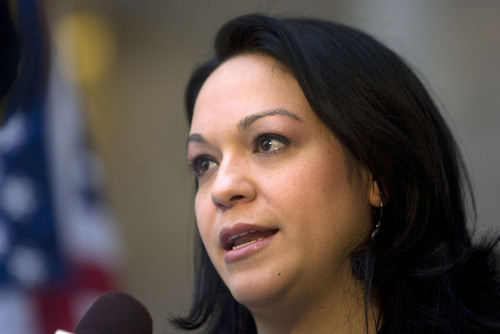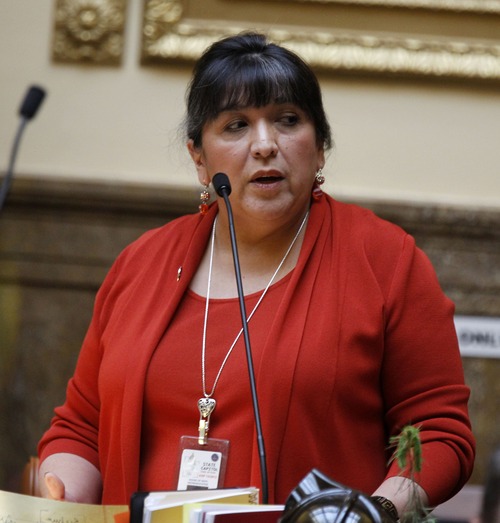This is an archived article that was published on sltrib.com in 2014, and information in the article may be outdated. It is provided only for personal research purposes and may not be reprinted.
Members of Utah's Latino Legislative Caucus — four Democrats — rebuked House Republicans on Wednesday for dithering over a Medicaid expansion.
"There's a lot of talking and no action. It's a travesty. It's immoral that so many individuals have no access to health care because the Legislature is sitting on this," said Sen. Luz Robles, D-Salt Lake City, at a Wednesday press conference staged to showcase key policy issues for Hispanic lawmakers.
Topping the list are two health concerns: air pollution and the decision facing Utah over whether to stretch Medicaid to cover more of the state's poor and uninsured. An expansion would disproportionately benefit Latinos, according a federal report released Tuesday.
If all states expanded Medicaid, the report says, up to 95 percent of the nation's eligible, uninsured Latinos would have access to affordable insurance — whether purchased on the Affordable Care Act's www.HealthCare.gov">http://www.HealthCare.gov or obtained through low-income government programs such as Medicaid.
The optional Medicaid expansion has been studied in Utah for the better part of a year. Two separate cost studies have shown the expansion would be a money-maker for the state while covering 123,000 of its 380,000 uninsured. A legislative task force and governor's working group have recommended a menu of conservatively-tailored expansion options.
But early in the current Legislative session House Speaker Becky Lockhart, worried about the uncertainty of promised federal funding, rejected any expansion plan relying on federal dollars, leaving House leaders to craft a state-financed fix.
"I'm trying to understand why we're developing a whole new model," said Health Reform Task Force member Rep. Rebecca Chavez-Houck, D-Salt Lake City. "We've done a lot of work and spent a lot of resources, including taxpayer dollars, studying this, and our colleagues haven't had a chance to thoroughly review it."
Republicans have held majority rule in Utah's Legislature for decades.
"We are pushing as hard as we can but we understand this is a numbers game, and we are outnumbered," said Robles.
But demographics — Latinos' growing share of Utah's population, unparalleled birth rate, relative youth and embrace of Democratic ideals — could one day tip the balance.
The decision about Medicaid resonates with Latino voters who disproportionately benefit from the Affordable Care Act.
Nationally nearly 8 in 10 uninsured Latinos are estimated to qualify for Medicaid or lower-cost private insurance on the federal health exchange, according to data released Tuesday by the U.S. Department of Health and Human Services (HHS).
In Utah 276,000 Latinos could similarly benefit from the health law, 86,000 of whom are uninsured, HHS says. Federal officials were unable to provide a breakdown showing how many would be covered through Medicaid.
"But in states that have moved forward with the expansion we're seeing Latinos getting access to the care they need and that is manifesting itself in good health outcomes for the Latino families," said Chavez-Houck.
Latinos are uninsured at higher rates; 16 percent of Americans under age 65 have no health coverage, compared to 24 percent of Latinos, according to HHS. They have higher rates of obesity and diabetes.
Twitter: @KSTewart4Trib —
Buying insurance
Latinos can apply for subsidies and purchase health coverage in Spanish on CuidadodeSalud.gov. Open enrollment ends on March 31.
Affordable Care Act enrollment steady but slowing in Utah. > B10





